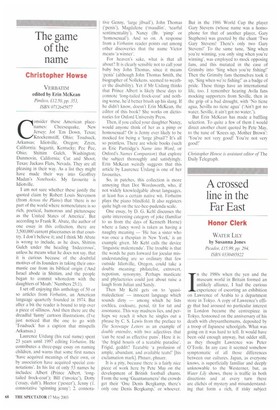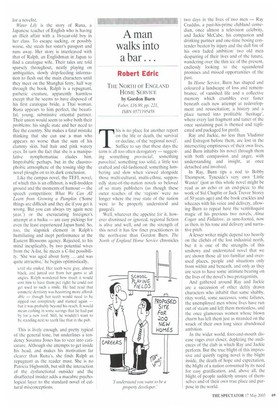A crossed line in the Far East
Honor Clerk
WATER LILY by Susanna Jones Picador, £15.99, pp. 294, ISBN 0330485822 1 n the 1980s when the yen and the museum world in Britain formed an unlikely alliance, I had the curious experience of escorting an exhibition on Lawrence of Arabia to a department store in Tokyo. A copy of Lawrence's effigy that had aroused no particular interest in London became the centrepiece in Tokyo, festooned on the anniversary of his death with chrysanthemums, deposited by a troop of Japanese schoolgirls. What was going on it was hard to tell. It would have been odd enough anyway, but odder still, as they thought Lawrence was Peter O'Toole. In any case it seemed somehow symptomatic of all those differences between our cultures. Japan, as everyone knows, is superficially familiar and deeply unknowable to the Westerner, but, as Water Lily shows, there is traffic in both directions and at every turn there are clichés of mystery and misunderstanding that form a rich, if risky subject Water Lily is the story of Runa, a Japanese teacher of English who is having an illicit affair with a 16-year-old boy in her class. To escape sacking, or possibly worse, she steals her sister's passport and runs away. Her story is interleaved with that of Ralph, an Englishman in Japan to find a catalogue wife. Their tales are told sparsely throughout, neatly playing on ambiguities, slowly drip-feeding information to flesh out the main characters until they meet on the Shanghai ferry, half way through the book. Ralph is a repugnant, pathetic creature, apparently harmless except that he seems to have disposed of his first catalogue bride, a Thai woman. Runa appears to him perfect, the beautiful, young, submissive oriental partner. Their union would seem to solve both their problems: his single state and her need to flee the country. She makes a fatal mistake thinking that she can use a man who appears no worse than the sum of his clammy skin, bad hair and pink watery eyes. In turn the fact that she is a manipulative nymphomaniac eludes him. Improbable perhaps, but in the claustrophobic atmosphere of the tossing ship the novel ploughs on to its dark conclusion.
Like the campus novel, the TEFL novel, of which this is an offshoot, is well-trodden ground and the moments of humour — the speech competition: What We Can All Learn from Growing a Pumpkin ('Some things are difficult and they die if you get it wrong. But you can always try again next year.') or the excruciating foreigner's attempt at a haiku — are easy pickings for even the least experienced Japan hand. So, too, the slapstick element in Ralph's humiliating and inept performance at the Eastern Blossoms agency. Rejected, to his mind inexplicably, by two potential wives from the A-list, he meets a C-list possibility. 'She was aged about forty ... and was quite attractive,' he begins optimistically,
until she smiled. Her teeth were grey, almost black, and jutted out from her gums at all angles. Ralph wondered how much it would cost him to have them put right; he could not get used to such a smile. He had read that cosmetic dentistry was becoming more affordable — though her teeth would need to be ripped out completely and started again — but it was probably beyond his reach. It would mean cashing in some savings that he had put by for a new roof. Still, he wouldn't want to be standing next to teeth like that in the pub.
This is lively enough, and pretty typical of the general tone, but underlines a tendency Susanna Jones has to veer into caricature. Although she attempts to get inside his head, and makes his motivation far clearer than Runa's, she finds Ralph as repugnant as the reader must. She is no Patricia Highsmith, but still the interaction of the dysfunctional outsider and the disaffected insider adds a macabre psychological layer to the standard novel of cultural misconceptions.



































































































 Previous page
Previous page